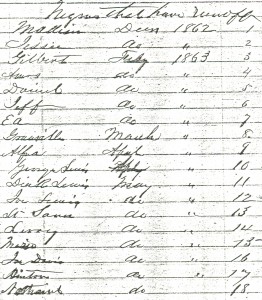President Lincoln’s Emancipation Proclamation, issued September 22, 1862, declared freedom to slaves in the confederate states that did not return to the control of the Union by January 1, 1863. It did not free slaves from the border states Kentucky, Maryland, Missouri, and Tennessee. Many slaves from these states, however, were already free by this time due to self-emancipation─running away or being abandoned by their owners.
George A. Washington realized that his slaves would soon be tempted to leave his plantation Wessyngton. At the same time the Union Army was recruiting black soldiers, George made an offer to hire some of his slaves for a rate of $10 per month. From February through May 1863, twenty-four men agreed to stay on the plantation and work for the offered $10 per month. Of those twenty-four, however; eighteen left within a few months. The men had worked on the plantation all their lives and no doubt wanted to see what the outside world had to offer and to taste freedom. The men must have seen the offered salary as an attempt to keep them on the plantation. The above document lists the eighteen individuals who ran away from Wessyngton Plantation from 1862-1863.
Tags: Abraham Lincoln, Civil War, Confederate Army, Contraband, Contraband Camps, Emancipation, Emancipation Proclamation, plantation slavery, President Lincoln, runaway slaves, Union Army
